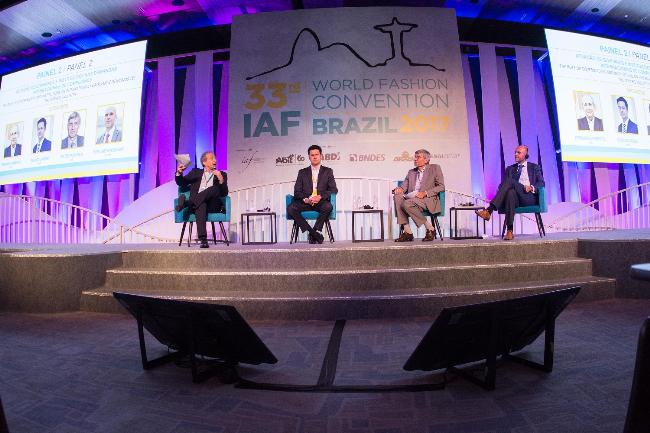Compliance: more opportunities than reasons for guilt

The panel “Government and Institutional Actions and International Compliance Requirements,” held in Rio de Janeiro (RJ) on October 17, during IAF’S World Fashion Convention, included discussions around compliance and what are the possibilities for companies in view an increasingly more demanding market.
Mr. Renato Jardim, superintendent of Industrial and Economic Policies at Abit, talked about that Entity’s projects to promote greater transparency and convergence among sector companies. “We see an opportunity for companies to become more productive and achieve greater results. More innovation and dynamism is required for a market that is going through deep transformations. At small companies it is much more difficult to fulfill compliance requirements. And those initiatives end up generating a contrary effect than the desired on, which is their exclusion from value chains. We have to be careful so that compliance is not a hindrance to those companies. Abit sees it much more as a collaborative work and not pointing fingers,” he stressed.
Mr. Roel Nieuwenkamp, CEO of OECD, talked a little about the work undertaken by that institution, which acts like a corporate responsibility body in developed countries. Thus, Governments in those nations have assumed the legal commitment of complying with OECD’S requirements. However, companies’ adhesion is not mandatory. “We are a problem-solving mechanism. So it is an initiative on behalf of companies. We receive complaints from civil society in relation to some brands and we mediate the conflict between both parties. If the negotiation fails, we then evaluate the situation. We have been helping companies to deal with unrealistic expectations,” he claimed. And he also concluded: “You don’t have to be perfect right from the start. But it is important to always try and improve.”
The lecture given by Mr. Peter Poschen, ILO’S director in Brazil, moved in the same direction as Mr. Roel’s. “Improving working conditions has to do not only with human rights, it also improves productivity and competitiveness,” said Mr. Poschen. The Organization has implemented a project called “Better Work,” involving more than 60 brands that have grown 25% after taking part in the program. That businessman also claimed the sector’s future might depend on the industry’s transformation and on fulfilling market requirements. “Improving working conditions might be the key to improve competitiveness, and this process should include employees in order to generate more transparent results,” he concluded.
Mr. Fernando Pimentel, Chairman of Abit, made some remarks on the issue. “Compliance has to be a two-way road, from suppliers to purchasers and vice-versa. It is a collective process and not a shell initiative. There are many converging points with the retail sector. Brazil is ahead in this area of overarching sustainability policies. Several actions have been implemented and that converge into a single standard,” he evaluated.
abit, IAF, IAF Brasil